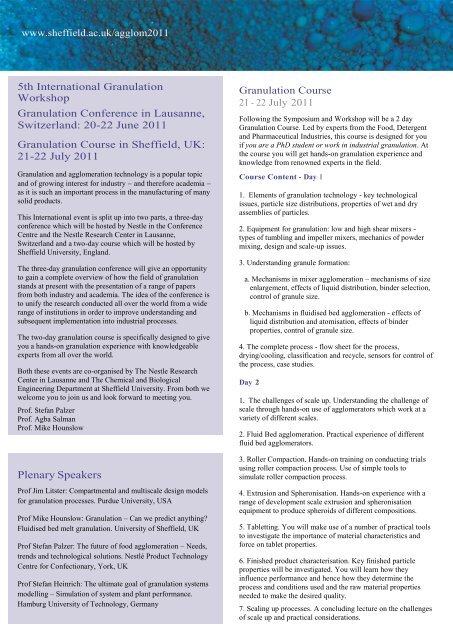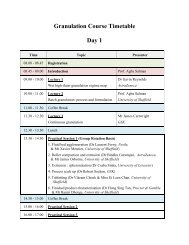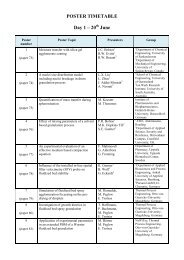5th International Granulation Workshop - University of Sheffield
5th International Granulation Workshop - University of Sheffield
5th International Granulation Workshop - University of Sheffield
Create successful ePaper yourself
Turn your PDF publications into a flip-book with our unique Google optimized e-Paper software.
www.sheffield.ac.uk/agglom2011<br />
<strong>5th</strong> <strong>International</strong> <strong>Granulation</strong><br />
<strong>Workshop</strong><br />
<strong>Granulation</strong> Conference in Lausanne,<br />
Switzerland: 20-22 June 2011<br />
<strong>Granulation</strong> Course in <strong>Sheffield</strong>, UK:<br />
21-22 July 2011<br />
<strong>Granulation</strong> and agglomeration technology is a popular topic<br />
and <strong>of</strong> growing interest for industry and therefore academia<br />
as it is such an important process in the manufacturing <strong>of</strong> many<br />
solid products.<br />
This <strong>International</strong> event is split up into two parts, a three-day<br />
conference which will be hosted by Nestle in the Conference<br />
Centre and the Nestle Research Center in Lausanne,<br />
Switzerland and a two-day course which will be hosted by<br />
<strong>Sheffield</strong> <strong>University</strong>, England.<br />
The three-day granulation conference will give an opportunity<br />
to gain a complete overview <strong>of</strong> how the field <strong>of</strong> granulation<br />
stands at present with the presentation <strong>of</strong> a range <strong>of</strong> papers<br />
from both industry and academia. The idea <strong>of</strong> the conference is<br />
to unify the research conducted all over the world from a wide<br />
range <strong>of</strong> institutions in order to improve understanding and<br />
subsequent implementation into industrial processes.<br />
The two-day granulation course is specifically designed to give<br />
you a hands-on granulation experience with knowledgeable<br />
experts from all over the world.<br />
Both these events are co-organised by The Nestle Research<br />
Center in Lausanne and The Chemical and Biological<br />
Engineering Department at <strong>Sheffield</strong> <strong>University</strong>. From both we<br />
welcome you to join us and look forward to meeting you.<br />
Pr<strong>of</strong>. Stefan Palzer<br />
Pr<strong>of</strong>. Agba Salman<br />
Pr<strong>of</strong>. Mike Hounslow<br />
Plenary Speakers<br />
Pr<strong>of</strong> Jim Litster: Compartmental and multiscale design models<br />
for granulation processes. Purdue <strong>University</strong>, USA<br />
Pr<strong>of</strong> Mike Hounslow: <strong>Granulation</strong> – Can we predict anything<br />
Fluidised bed melt granulation. <strong>University</strong> <strong>of</strong> <strong>Sheffield</strong>, UK<br />
Pr<strong>of</strong> Stefan Palzer: The future <strong>of</strong> food agglomeration – Needs,<br />
trends and technological solutions. Nestlé Product Technology<br />
Centre for Confectionary, York, UK<br />
Pr<strong>of</strong> Stefan Heinrich: The ultimate goal <strong>of</strong> granulation systems<br />
modelling – Simulation <strong>of</strong> system and plant performance.<br />
Hamburg <strong>University</strong> <strong>of</strong> Technology, Germany<br />
<strong>Granulation</strong> Course<br />
21 - 22 July 2011<br />
Following the Symposium and <strong>Workshop</strong> will be a 2 day<br />
<strong>Granulation</strong> Course. Led by experts from the Food, Detergent<br />
and Pharmaceutical Industries, this course is designed for you<br />
if you are a PhD student or work in industrial granulation. At<br />
the course you will get hands-on granulation experience and<br />
knowledge from renowned experts in the field.<br />
Course Content - Day 1<br />
1. Elements <strong>of</strong> granulation technology - key technological<br />
issues, particle size distributions, properties <strong>of</strong> wet and dry<br />
assemblies <strong>of</strong> particles.<br />
2. Equipment for granulation: low and high shear mixers -<br />
types <strong>of</strong> tumbling and impeller mixers, mechanics <strong>of</strong> powder<br />
mixing, design and scale-up issues.<br />
3. Understanding granule formation:<br />
a. Mechanisms in mixer agglomeration – mechanisms <strong>of</strong> size<br />
enlargement, effects <strong>of</strong> liquid distribution, binder selection,<br />
control <strong>of</strong> granule size.<br />
b. Mechanisms in fluidised bed agglomeration - effects <strong>of</strong><br />
liquid distribution and atomisation, effects <strong>of</strong> binder<br />
properties, control <strong>of</strong> granule size.<br />
4. The complete process - flow sheet for the process,<br />
drying/cooling, classification and recycle, sensors for control <strong>of</strong><br />
the process, case studies.<br />
Day 2<br />
1. The challenges <strong>of</strong> scale up. Understanding the challenge <strong>of</strong><br />
scale through hands-on use <strong>of</strong> agglomerators which work at a<br />
variety <strong>of</strong> different scales.<br />
2. Fluid Bed agglomeration. Practical experience <strong>of</strong> different<br />
fluid bed agglomerators.<br />
3. Roller Compaction. Hands-on training on conducting trials<br />
using roller compaction process. Use <strong>of</strong> simple tools to<br />
simulate roller compaction process.<br />
4. Extrusion and Spheronisation. Hands-on experience with a<br />
range <strong>of</strong> development scale extrusion and spheronisation<br />
equipment to produce spheroids <strong>of</strong> different compositions.<br />
5. Tabletting. You will make use <strong>of</strong> a number <strong>of</strong> practical tools<br />
to investigate the importance <strong>of</strong> material characteristics and<br />
force on tablet properties.<br />
6. Finished product characterisation. Key finished particle<br />
properties will be investigated. You will learn how they<br />
influence performance and hence how they determine the<br />
process and conditions used and the raw material properties<br />
needed to make the desired quality.<br />
7. Scaling up processes. A concluding lecture on the challenges<br />
<strong>of</strong> scale up and practical considerations.




